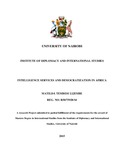| dc.description.abstract | This study addresses issues surrounding democracy as an ideology and how it influences the
operations of intelligence services in Africa. The study identifies Kenya as a case study since
it has been recognized as one of the African states that had a dark past in terms of human
rights and which has enacted a new Constitution through a popular vote. The objectives of the
study are; to investigate the influence of democracy on intelligence services, to establish the
role of intelligence services and how they are affected by political regimes in Africa and to
investigate the democratization of intelligence services in Africa with focus on Kenya.
Official government documents, news reports and other literature on the intelligence system
in Kenya, as well as studies of intelligence oversight within democracies are the primary
sources of data. The study uses purposive sampling to select the respondents from relevant
government departments. The main interest is on government officials in the NIS, the
judiciary, parliament, provincial administration, the police, civil society and government
officers who sit in the National Security Council. Some of the major findings of the study are
that the intelligence service in Kenya has undergone a dramatic change in terms of the way it
operates compared to the practice during one-party rule. The study also established that
different government institutions have the mandate to conduct oversight over the functions of
the intelligence service in Kenya. Parliament for instance is able to scrutinize and approve
yearly budget spending for the intelligence service, though the oversight procedures face
challenges due to the provision in the Constitution for confidential expenditure for secret
services. As an organization, NIS has been reformed in accordance with norms and practices
developed in contemporary Western democracies, mostly through exchange programmes and
direct involvement in training and capacity building. As Kenya continues the process of
democratic consolidation, the issue of intelligence oversight remains vital to ensure political
accountability and financial efficiency. Oversight of intelligence is also important to the
political initiatives Kenya has undertaken to improve its political stability and national
security. | en_US |

